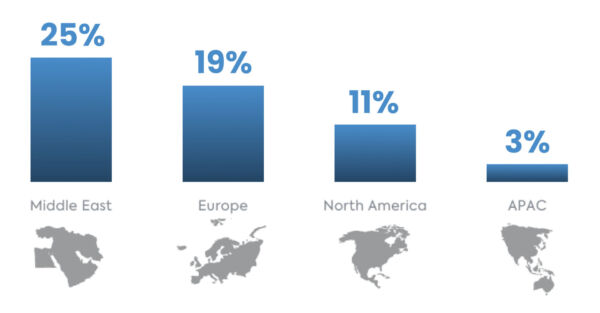Black Friday is here again! On November 28, the biggest shopping frenzy of the year will kick off in full force. Online sales in Europe are once again expected to grow this year, continuing last year’s trend – when sales during the Black Friday and Cyber Monday weekend increased by approximately 19% year over year (2023–2024).
Source: GlobalE
For e-shops, this is understandably a crucial period. According to surveys, as many as 73% of retailers generate more than one-fifth of their annual revenue between Black Friday and the end of December.
But be careful. Black Friday isn’t the finish line. It’s the starting point. What you do afterward will determine whether you turn one-time shoppers into loyal fans.
Why Focus on the Period After Black Friday?
While Black Friday brings a surge of visitors and one-time orders, the real challenge begins afterward – turning those customers into loyal fans.
Data shows that 57% of customers decide whether to make a repeat purchase based on their experience with delivery, communication, and product quality. This means the first purchase is only the beginning – the real work for an e-shop continues long after the sale weekend is over.
Source: Sendcloud
What we want to emphasize is this: Black Friday brings traffic, but December brings profit. That’s why it’s crucial to focus on the post–Black Friday period and use it to drive repeat purchases, customer retention, and long-term loyalty.
This naturally leads to the specific steps and metrics every e-shop should track to maintain momentum even after the big sales weekend.
6 Key Steps After Black Friday
1. Evaluate Your Campaign Results and Data
Start with an in-depth analysis of your campaigns. Track the following metrics:
- CTR (Click-Through Rate) – which ads attracted the most attention
- CVR (Conversion Rate) – which campaigns actually led to sales
- CAC (Cost per Acquisition) – how much a new customer cost you
- AOV (Average Order Value) – what the average order value was
- LTV (Lifetime Value) – the long-term value of a customer.
For example, if you gained 1,000 new customers with a CAC of €12 and an AOV of €60, your December goal could be to increase AOV by 10-15% through cross-selling and remarketing. This approach helps you optimize your budget, identify which products performed best, and determine which channels delivered the highest return.
2.Maintain Communication. Not Just Through Discounts
After Black Friday, it’s critical to stay in touch with your customers. Sending personalized messages significantly increases the likelihood of repeat purchases. The most effective formats include:
- Thank-you messages after a purchase
- Personalized recommendations (“You bought X – here are related product ideas”)
- Discount codes or special offers for the next order
According to marketing channel statistics, SMS campaigns achieve CTR rates of 19–20%, while email campaigns typically reach only 2–5%. Such relevant and well-timed communication greatly improves customer retention and prevents customers from going silent after the shopping weekend.
3.Launch Remarketing Campaigns
Use your Black Friday weekend data for remarketing – track who viewed products, abandoned their cart, or made only a single purchase. Focus on:
- Abandoned carts
- Viewed products without purchase
- One-time buyers
Tip: With tools like BlueWinston, you can automatically generate remarketing campaigns for specific product groups and optimize CPC and ROAS based on performance. This way, you can effectively re-engage visitors who haven’t made another purchase yet and increase the likelihood of repeat conversions.
If you have any questions or need guidance on ad management or optimization, don’t hesitate to reach out to our certified team of PPC specialists – they’ll be happy to assist you during a free consultation.
4.Optimize Budgets and Bids
After Black Friday, competition remains high, but campaign efficiency may decline. Keep a close eye on key metrics such as:
- ROAS (Return on Ad Spend) – monitor your return on investment and keep it within a safe range
- CPA (Cost per Action) – if it increases by more than 20%, adjust your bids or exclude underperforming keywords.
By doing so, you’ll ensure that your marketing budget is used efficiently and your investments deliver the expected return.
5. Focus on Retention – Loyalty Is Gold
Keeping an existing customer is far more efficient than acquiring a new one. Invest in:
- Loyalty programs that reward repeat purchases, referrals, or reviews
- Personalized offers: extra discounts for existing customers, “VIP early access” to sales, or points for purchases
Statistics show that a well-designed loyalty program can increase the likelihood of repeat purchases by 25–30% in the e-commerce segment.
6.Prepare for January
The most successful e-shops don’t stop after Christmas. In December, they plan campaigns like “New Year, New You” – including sales, clearance promotions, retargeting, and personalized offers. This helps keep customer attention even after the holiday rush and turn Black Friday traffic into long-term customers.
Conclusion
The winner isn’t the one who sells the most on Black Friday, but the one who knows what to do afterward… Black Friday brings traffic, but it’s the post-Black Friday period that reveals who can turn that attention into long-term growth.
Analyze, optimize, retarget, and automate and if you want to be sure your campaigns are working efficiently, let BlueWinston handle it for you.
 Get Microsoft Ads setup, tools and coupon for
Get Microsoft Ads setup, tools and coupon for  free!
free! 








